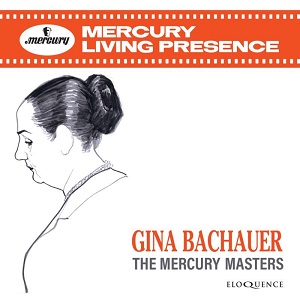
Gina Bachauer (piano)
The Mercury Masters
rec. 1962-64
ELOQUENCE 484 4358 [7 CDs: 315]
Between July 1962 and July 1964 Greek pianist Gina Bachauer (1910-76) recorded seven LPs for Mercury in London and New York. They’ve now been packaged together for the first time and appear as Original Jacket releases in a handy Eloquence box.
The Brahms B flat major concerto was taped with the LSO and Stanisław Skrowaczewski in London’s Watford Town Hall, a reading of commanding control and precision. Fluid and powerful in the Scherzo, her articulation is razor sharp and she excavates bass sonorities with intensity. My principal complaint about an otherwise highly impressive performance is the slow movement. Cellist Kenneth Heath sounds unduly hurried and the tempo throughout sounds curt. If you’re used to Rubinstein or Gilels you will certainly find it uncomfortably faceless. The finale is much better, taken at a fine tempo and full of felicitous orchestral detailing and good rhythmic charge – it’s light enough too.
At the same sessions, which stretched for some days – the Brahms was recorded over four days – the same forces also recorded Beethoven’s Emperor Concerto. The orchestra is again on committed form – this was a good time for the LSO – and the recording lives up to the august Mercury name; clarity-conscious, colourful and very up-front. The rapport between soloist and conductor seems strong and Bachauer is nobly elevated in the central movement. I tend to disagree with critics who find her lacking in poetry, as I think of her as an exponent of poetic bravura.
This is a strong element of the success of the third disc in which she plays Stravinsky’s Three Movements from Petrushka with exceptional clarity and technical accuracy. Her Chopin Polonaise in A flat major shows those qualities but is perhaps lacking in some light and shade and though there’s a strongly voiced, admirable Liszt Hungarian Rhapsody No.12 to enjoy, some of her best playing comes in Brahms’ Variations on a theme by Paganini, of which only Book II is performed. This is the kind of performance that has one wishing that the companion book had been preferred to the Chopin.
The two Chopin Concertos were recorded with Antal Doráti replacing Skrowaczewski and can be found in CDs 4 and 7. The First in E minor finds the conductor providing an excellent supportive tissue for Bachauer who is quite lyrical, though not effusively so, in the slow movement. The ancillary pieces in the fourth disc are the Nocturne in C sharp minor and three of the Op.25 Etudes – admirably played, once again, though the etudes sound to me rather hard-edged tonally. This is their first CD appearance, according to the documentation, something that applies to the filler for the Concerto No.2 on CD 7, the Fantaisie in F minor. The Second Concerto makes a fine match for the First and was recorded toward the very end of these Mercury sessions, in June 1964.
CD 5 contains Beethoven’s G major concerto and its coupling, the Sonata in E major, Op.14 No.1. Again, there is definition of the orchestral sound to admire, as much Doráti’s work as the Mercury engineering, and Bachauer’s precision and rhythmic vitality are alike excellent. She scales her playing in the slow movement appropriately, so it’s not the most towering confrontation between solo piano and orchestral strings, but it is balanced and apt in the context of her playing of the concerto as a whole. She scales down her playing in the sonata, which is warmly done, slightly warmer in fact than in the concerto itself.
Her French repertoire can be heard in CD 6, where she plays Gaspard de la nuit in a recording in which the poems of Aloysius Bertrand are translated into English by Christopher Fry and spoken by John Gielgud. These are separately tracked so you can omit them if you wish to, though I suppose this militates against the LP’s integrity, if such things matter to you. This is formidable pianism, free of colouristic pedal wash, but instead focused on digital clarity. It’s perfectly balanced by Debussy’s Pour le piano and by three of the Préludes.
The documentation is first class, as always with Eloquence, and remastering similarly. Bachauer was a prodigiously gifted player and certainly deserves this full treatment.
Jonathan Woolf
Help us financially by purchasing from



Contents
CD 1
Johannes Brahms (1833-1897)
Piano Concerto No. 2 in B flat major, Op.83
London Symphony Orchestra/Stanisław Skrowaczewski
rec. July 1962, Watford Town Hall, London
CD 2
Ludwig van Beethoven (1770-1827)
Piano Concerto No. 5 in E flat major, Op.73 ‘Emperor’
London Symphony Orchestra/Stanisław Skrowaczewski
rec. July 1962, Watford Town Hall, London
CD 3 Igor Stravinsky (1882-1971)
Three Movements from Petrouchka Fryderyk Chopin (1810-1849)
Polonaise No.6 in A flat major, Op. 53*
Franz Liszt (1811-1886)
Hungarian Rhapsody No. 12 in C sharp minor, S.244 Johannes Brahms (1833-1897)
Variations on a theme by Paganini, Op.35: Book II
*First release on CD
rec. February 1963, Fine Recording Studios, NYC
CD 4
Fryderyk Chopin (1810-1849)
Piano Concerto No. 1 in E minor, Op.11 Nocturne, Op. 27 No. 1*
3 Études, Op. 25*
London Symphony Orchestra/Antal Doráti
*First release on CD
rec. July 1963, Watford Town Hall, London (Concerto): July 1963, Fine Recording Studios, NYC (remainder)
CD 5
Ludwig van Beethoven (1770-1827)
Piano Concerto No. 4 in G major, Op.58
Piano Sonata, Op. 14 No. 1
London Symphony Orchestra/Antal Doráti
rec. July 1963, Watford Town Hall, London
CD 6
Maurice Ravel (1875-1937)
Gaspard de la nuit
Claude Debussy (1862-1918)
Pour le piano, L95
3 Préludes: Book 1 No.10 La Cathédrale engloutie; Book II No.5 Bruyères: Book I No.1 Danseuses de Delphes
Sir John Gielgud (narrator)
rec. July 1964, Watford Town Hall, London
CD 7
Fryderyk Chopin (1810-1849)
Piano Concerto No. 2 in F minor, Op.21
Fantaisie, Op. 49*
London Symphony Orchestra / Antal Doráti
*First release on CD
rec. June-July 1964, Watford Town Hall, London



















